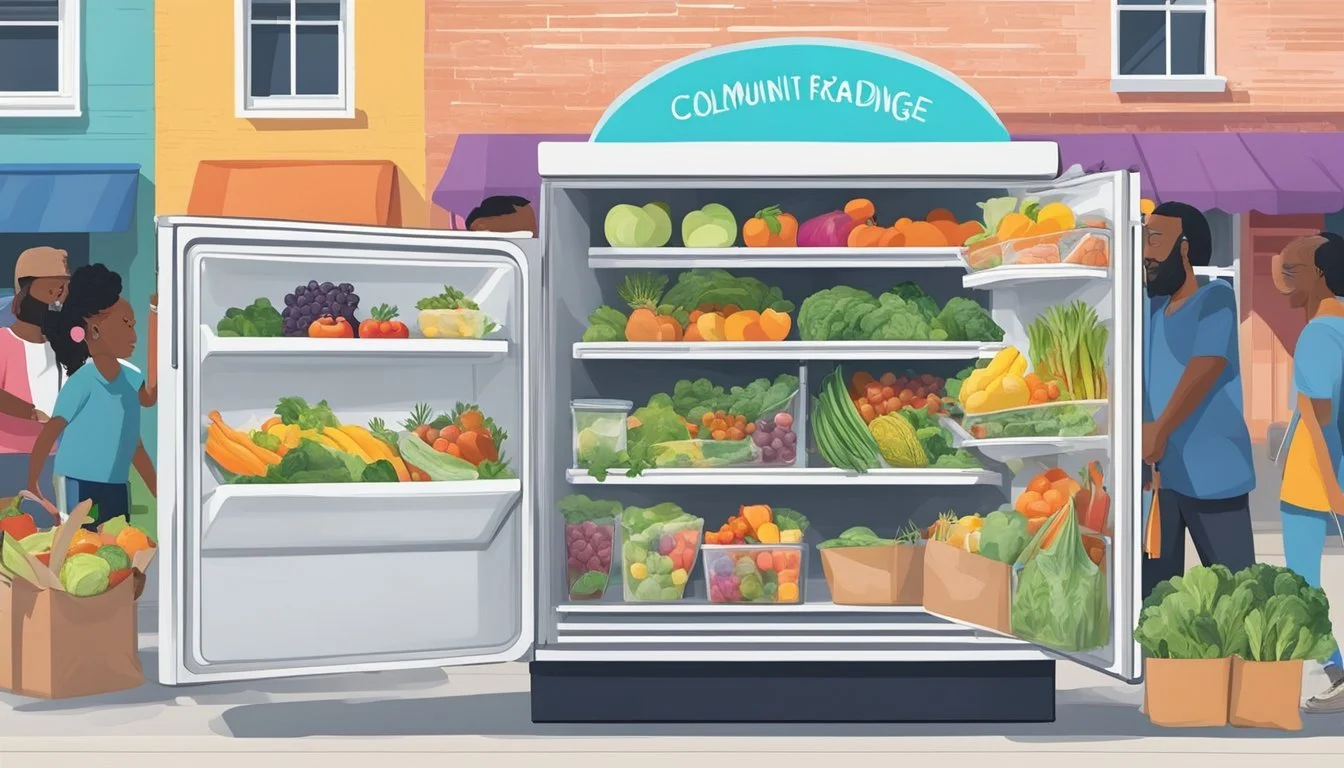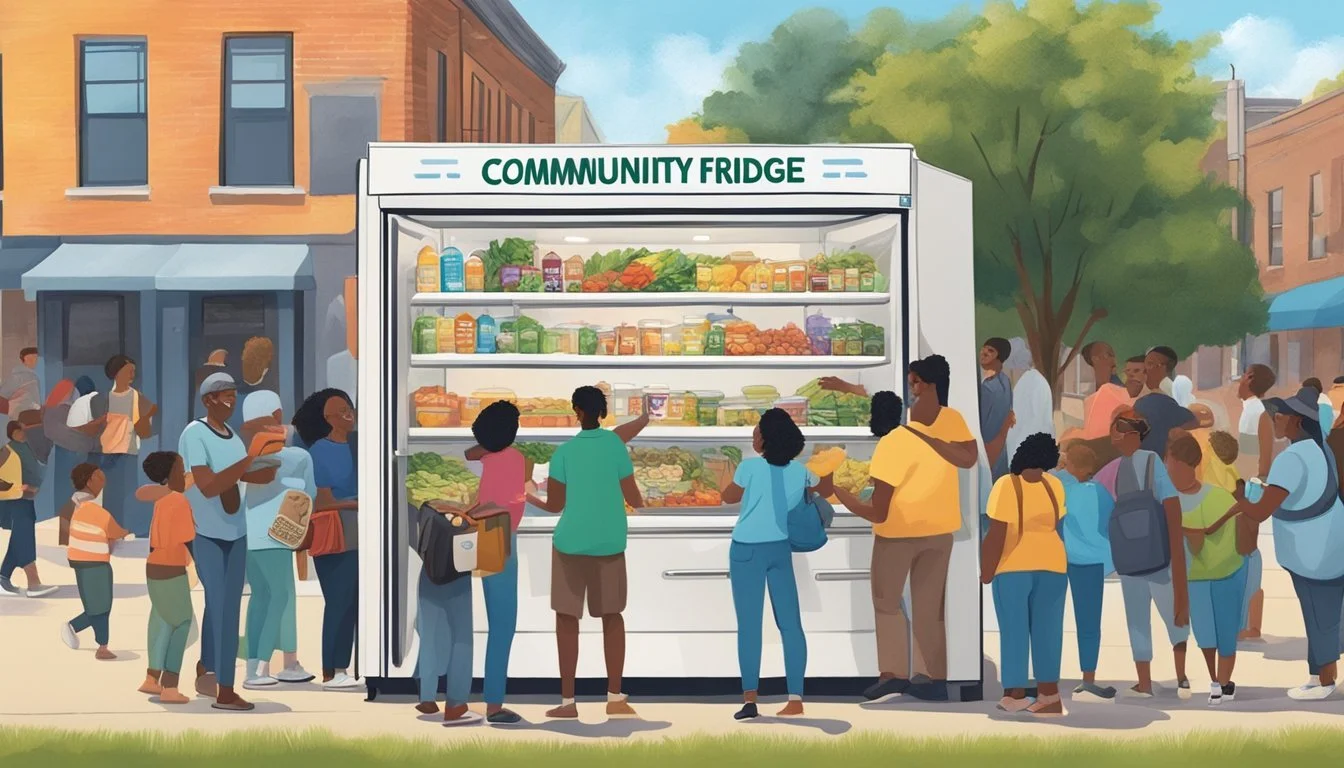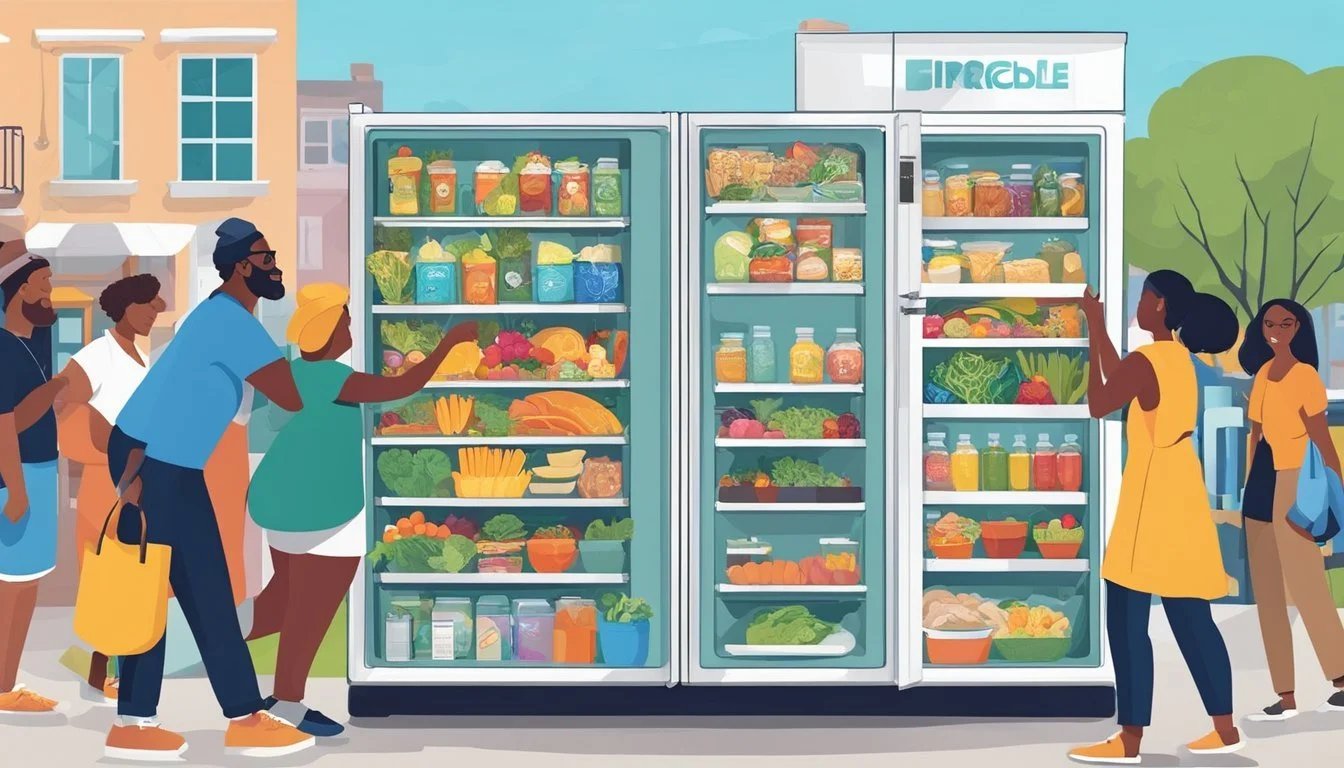Columbia, SC Community Fridge
Addressing Food Insecurity with Compassion
In Columbia, South Carolina, a novel approach to food redistribution and sustainability has taken root in the form of community fridges. These fridges serve as a public resource, offering an accessible space for residents to share surplus perishable food. By operating on an honor system, the initiative makes it possible for everyone in the community to access food freely while also addressing the persistent issue of food waste. Over a period of months, a single community fridge has the potential to redistribute significant amounts of food that would otherwise go to waste, simultaneously reducing environmental impact and supporting those in need.
The success of the Midlands Community Fridge Program in Columbia is demonstrative of the larger movement towards mutual aid and food security. Encouraging the ethos of 'Take As You Need, Give As You Can,' this program exemplifies how local communities can come together to directly tackle hunger and support each other. Residents of Columbia and the broader Midlands area are both contributors to and beneficiaries of these community fridges, which have become a vital component in the fight against food scarcity, reinforcing the community's interconnectedness and resilience.
Community fridges in Columbia are not merely stand-alone efforts; they are part of a wider network recognized for reducing food waste and promoting food sharing on a global scale. The intentional placement of these fridges in accessible locations underscores the community's commitment to inclusivity and collective well-being. This movement towards a more sustainable and equitable approach to food accessibility reflects a growing consciousness around the importance of community-driven solutions in the realm of food justice.
Concept and Purpose of Community Fridges
Community fridges serve to combat food waste and provide access to nutritious food for those in need, operating on the principles of mutual aid and community trust.
Origins and Global Presence
Community fridges originated as a grassroots response to hunger and food wastage. Countries like Spain and Germany have been pioneering in the "solidarity fridge" movement, whereas the UK and Ireland have also seen significant growth in such initiatives. These fridges, globally recognized as community or solidarity fridges, redistribute surplus food and foster a sense of community.
Community Fridge Vs. Solidarity/Honesty Fridges
While the terms community fridge and solidarity fridge are often used interchangeably, "honesty fridge" is a derivative concept prevalent in areas like Spain. The key distinction lies in the governance:
Community Fridge: Typically organized by community groups.
Solidarity/Honesty Fridge: Often set up by businesses or individuals where food is left out, trusting people to only take what they need.
Mutual Aid and Reducing Hunger
Community fridges are a tangible manifestation of mutual aid, supporting individuals to tackle the pressing issue of hunger. These initiatives not only provide immediate access to food but also save households and community groups significant expenses. It's an inclusive approach to ensure that good food reaches those who need it, strengthening community resilience.
Benefits to Local Communities
The Community Fridge in Columbia, SC, is a pivotal resource that serves to enhance local cohesion, foster economic growth, and ensure food security. This initiative stands as a testament to the power of community solidarity and pragmatic resource sharing.
Promoting Local Employment and Art
The Columbia Community Fridge not only acts as a hub for food sharing but also stimulates local employment by involving community members in its maintenance and operation. This encouragement of local employment extends to local artists, who often contribute by decorating the fridges, thus turning a communal necessity into a canvas that celebrates local culture and talent.
Strengthening Local Business Partnerships
Local businesses benefit from partnering with the Community Fridge. By contributing surplus produce, businesses can reduce waste while enhancing their standing in the community. This symbiotic relationship reinforces a supportive network between businesses and residents, fostering a stronger, resilient local economy.
Local Businesses Contributions Community Impact Surplus food donations Reduced waste In-kind support and services Strengthened community ties
Enhancing Access to Nutritious Food and Saving Money
The fridges ensure that nutritious food is available to community members who may otherwise face food insecurity. This not only supports the health and well-being of the residents but also helps them save money on groceries. Furthermore, by averting the disposal of good food, the Columbia Community Fridge aids in mitigating food waste—a positive outcome for both the community and the environment.
Nutritional Impact: Better access to fresh produce and balanced meals.
Economic Impact: Decreased food expenses for community members.
Health and Safety Protocols
In ensuring the safety and efficacy of community fridges in Columbia, SC, specific health and safety protocols have been established. These protocols are designed to mitigate food waste while guaranteeing the well-being of community members.
Guidelines for Food Donation
Community fridges in Columbia operate under clear guidelines to ensure that the food donated is safe and suitable for consumption. Here are key points to follow:
Perishable Items: Perishable food items should be fresh and within their use-by dates. If food items exhibit any signs of spoilage, they must not be donated.
Non-perishables: Canned and dry goods should be unopened and undamaged, with labels intact.
Prohibited Items: Homemade foods, opened packages, or any items that have been recalled or violate food safety standards are not allowed.
Volunteers monitor the donations at least weekly to adhere to these safety measures and to perform necessary cleaning and maintenance tasks.
Hygiene and Prevention Measures
To prevent the spread of illnesses and ensure the cleanliness of the community fridge spaces, several hygiene and prevention measures are in place:
Mask Wearing: It is advised that individuals wear masks while stocking or retrieving items from the fridges as a precautionary measure against the transmission of viruses such as COVID-19.
Cleaning Protocol: A regular cleaning schedule is followed, with a 5-step guide: 1) Wear gloves, 2) Remove expired or spoiled items, 3) Clean surfaces, 4) Check temperature settings, and 5) Organize items for easy access.
Sanitization Supplies: Hand sanitizers and disinfectant wipes are provided near the fridges for public use.
These measures are enforced to maintain the highest standards of health and safety and to minimize food waste through the proper management of the community fridge resources.
Environmental Impact and Sustainability
Community fridges in Columbia, SC significantly contribute to environmental sustainability by addressing the critical issues of food waste and its consequential impact on landfills. They offer a practical solution to redirect surplus food that would otherwise contribute to waste.
Reducing Food Waste and Landfill Use
Community Fridges in Columbia have established an effective system for reducing food waste. By redistributing 12 tons of food waste in a span of three months, they extend the life cycle of perishable goods and minimize the volume of waste that accumulates in landfills. Households and community groups can save an estimated $10,000 on food they would have purchased, emphasising the substantial environmental and economic benefits of this initiative.
Impact:
12 tons of waste redirected from landfills
$10,000 in savings for communities
Engaging Local Businesses in Waste Reduction
Local businesses are encouraged to participate in waste reduction efforts by donating surplus food to community fridges. This "Take As You Need, Give As You Can" model not only assists in feeding the hungry but also plays a significant role in creating a sustainable cycle of food distribution.
Benefits for Businesses:
Reduces the volume of excess food disposed of
Strengthens community ties through active participation in sustainability efforts
By involving businesses, Columbia's community fridges foster a sense of shared responsibility, making sustainability a collective endeavor.
Community Fridge Operations
Community Fridge programs in Columbia, SC, operate by placing refrigerators in public spaces where food can be shared among community members. These fridges rely on a trust-based honor system and are supported by organizational efforts to maximize their effectiveness and reach.
Honor System and Public Accessibility
Community Fridges rely on an honor system to function effectively. Individuals are encouraged to take food according to their needs and donate when they can. This approach fosters a sense of communal trust and responsibility. The fridges are strategically placed in accessible public spaces, ensuring they are available to as wide an audience as possible. This accessibility helps in addressing the demand for community fridges within the area, as they are crucial in redistributing food to those who need it most.
Organizational Support and Success Factors
Community fridges are supported by various organizations that track the success and sustainability of these programs. Key success factors include:
Redistribution of Food Waste: They play a crucial role in redistributing food that would otherwise go to waste, significantly aiding in food waste reduction efforts.
Cost Savings: For households and community groups, community fridges can result in substantial food cost savings, often totaling thousands of dollars.
The community fridge network not only involves the placement of the fridge but also the continuous monitoring and management to ensure a steady supply of donations and maintenance of the facility.
Encouraging Community Participation
Community fridges in Columbia, SC serve as a cornerstone for local participation and mutual aid, providing a straightforward way for residents to reduce food waste and address food insecurity.
How to Get Involved
Residents interested in supporting their local community fridge network can participate in several ways:
Donate: Individuals can donate food directly at the fridge locations. Perishable food items and fresh produce are especially beneficial to keep the fridges stocked.
Volunteer: Community members can offer their time to clean and maintain the fridges, ensuring they remain welcoming and safe for all.
Spread the Word: Sharing information about the fridge and its impact on social media or through word of mouth helps increase community involvement.
Leveraging Community Events
To boost participation, organizers can align with community events to:
Organize Food Drives: Events are an excellent opportunity for community fridges to host food drives, encouraging attendees to bring donations.
Educational Outreach: They can set up informational booths at local events to educate the public on the importance of the fridge and how to contribute.
By engaging with the local community through these channels, the Columbia community fridge initiative continues to thrive and serve those in need.
Regional Spotlight: Midlands Community Fridges
The concept of community fridges has been successfully implemented in the Midlands region of South Carolina, embodying a practical approach to addressing food insecurity and waste.
Community Fridges in Columbia, SC
In Columbia, the Midlands Community Fridge Program operates on a simple yet effective principle: "Take As You Need, Give As You Can." It represents the first initiative of its kind in the Midlands, and it actively invites residents to participate in reducing hunger through community contribution. These fridges are strategically placed in accessible public spaces to ensure that surplus perishable food is freely available to all members of the community. The success of these fridges is partly due to their reliance on an honor system, which fosters trust and reciprocity among users.
Location of Fridges: Accessible public areas
Model: Mutual aid, "Take As You Need, Give As You Can"
Goal: Alleviate hunger and reduce food waste
Expansion and Impact in Lexington
The reach of community fridges has extended to Lexington, amplifying their impact. They serve as a testament to the scalability of such community-based programs to adjacent areas. Lexington's embracement of the community fridge program further represents regional commitment to the cause.
Food Redistribution: Over 3 months, one fridge can redistribute an estimated 12 tons of food.
Cost Savings: The initiative has the potential to save households and community groups collectively over $10,000 in food costs.
The success in Lexington echoes the positive outcomes seen in Columbia, indicating a replicable model for other communities to follow. The expansion showcases the potential for community fridges to play a significant role in addressing regional food insecurity while also contributing to environmental sustainability by reducing food waste.
Conclusion
The establishment of Community Fridges in Columbia, SC reflects a compassionate approach to tackling food insecurity and food wastage issues that urban areas face. Initiatives such as the Midlands Community Fridge Program have adopted the "Take As You Need, Give As You Can" model, fostering a community atmosphere centered on support and mutual aid.
Impact on Food Waste and Savings:
12 tons of food redistributed over three months.
Households and community groups save over $10,000 in food costs collectively.
Community Fridges are not just refrigerators; they are symbols of community trust and cooperation. They rely on the principle that access to food is a universal right and work towards an inclusive way of providing for it. These refrigerators are situated in public spaces, encouraging a wide demographic of Columbia residents to participate in this sustainable exchange of resources.
Each fridge stands as a testament to the community's ability to self-organize and create pragmatic solutions to social challenges. By alleviating hunger and reducing waste, Community Fridges serve as a beacon of hope. Their existence continues to encourage other cities to consider similar projects, highlighting the success that can be achieved when communities come together for a common good.









